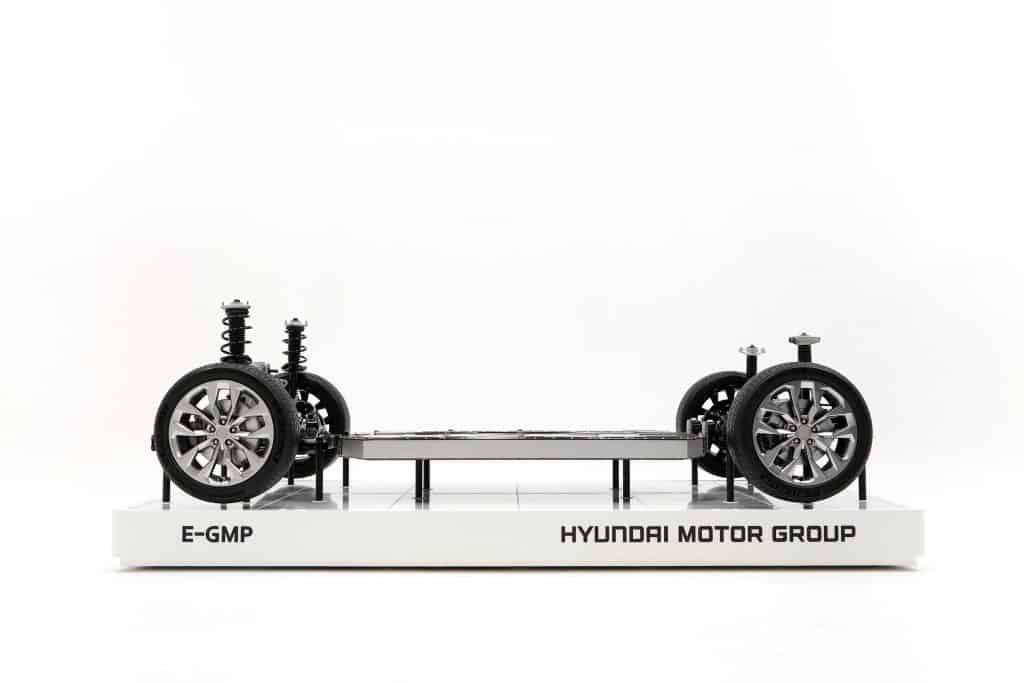Hyundai Motor Group has unveiled its new Electric-Global Modular Platform (E-GMP), a dedicated battery electric vehicle (BEV) platform. Revealed online today during an ‘E-GMP Digital Discovery’ event, the platform will serve as the core technology for Hyundai Motor Group’s next-generation BEV line-up.
Designed exclusively for BEVs, E-GMP provides various advantages compared to the Group’s existing platforms, which have each been engineered predominantly to accommodate internal combustion engines. Benefits include increased development flexibility, powerful driving performance, increased driving range, strengthened safety features, and more interior space for occupants and luggage.
“Today our front-wheel driven Hyundai and Kia BEVs are already among the most efficient ones in their segments,” said Albert Biermann, President and Head of R&D Division for Hyundai Motor Group. “With our rear-wheel driven based E-GMP, we are extending our technological leadership into segments where customers demand excellent driving dynamics and outstanding efficiency.”
“E-GMP is the culmination of years of research and development and brings together our most cutting-edge technologies. Our BEV line-up will evolve and be strengthened by this innovative new platform,” said Fayez Abdul Rahman, Senior Vice President of Vehicle Architecture Development Center for Hyundai Motor Group.
E-GMP reduces complexity through modularization and standardization, allowing rapid and flexible development of products. This can satisfy various customer needs for vehicle performance. Among these, a high performance model will accelerate from zero to 100kph in less than 3.5 seconds and achieve a maximum speed of 260km/h.
The E-GMP’s compact new power electric (PE) system consists of a powerful motor, EV transmission and inverter. These three components are integrated into a single compact module. This ensures powerful performance by raising the motor’s maximum speed by up to 70 percent compared to existing motors.
E-GMP relies on the rear wheel for propulsion. Customers will be able to choose between rear-wheel and all-wheel drive configurations; models with the latter can be equipped with an additional motor. The all-wheel drive system includes an EV transmission disconnector, which can control the connection between the additional motor and front wheels, and switch between two-wheel and all-wheel drive modes to enhance efficiency.
All vehicles developed with the E-GMP platform use a standardized single type of battery module. This module is composed of pouch-type standard cells and can be packed in different quantities as required for each vehicle.
Unlike previous BEVs, which only accept one-way charging, the E-GMP’s charging system is more flexible. The E-GMP’s newly developed Integrated Charging Control Unit (ICCU) enables a new vehicle-to-load (V2L) function, which can additionally discharge energy from the vehicle battery without additional components.
The E-GMP will underpin Hyundai Motor Group’s plans to introduce a total of 23 BEV models including 11 dedicated BEV models, and sell more than 1 million BEVs worldwide by 2025. As part of its BEV vision, Hyundai Motor Company launched its dedicated ‘IONIQ’ BEV brand in August 2020, which includes three dedicated BEV models, the IONIQ 5,6 and 7 by 2024. Kia is also undergoing a transformation for the era of electrification, based on its ‘Plan S’ mid-to-long term strategy.
